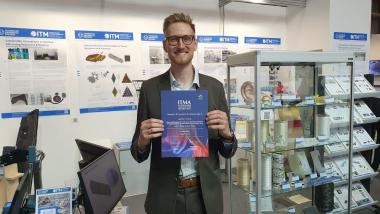Philipp Weigel erhält 1. Preis des ITMA Research & Innovation Excellence Award
Im Rahmen der diesjährigen ITMA 2023, der internationalen Textilmaschinenausstellung und Plattform für die gesamte Textilmaschinenbranche, die vom 08. bis 14. Juni 2023 in Mailand stattfand, wurde Herr Dipl.-Ing. Philipp Weigel für seine am ITM angefertigte exzellente Studienarbeit "Numerische Simulation des Struktur- und Auszugverhaltensparametrisch generierter profilierter Carbonpolymergarne" mit dem ITMA Sustainable Innovation Award in der Kategrie "Research & Innovation Excellence Award" ausgezeichnet. Er erhielt hierfür den 1. Preis, der mit 10.000 EUR dotiert ist.
Die Arbeit ist von großem wissenschaftlichen Interesse für die Entwicklung hochleistungsfähiger, ressourcenschonender Carbonbetonbauteile mit höchster Materialeffizienz und Nachhaltigkeit sowie für die simulative Beschreibung und digitale Auslegung der Bewehrungsstruktur.
CEMATEX-Präsident Ernesto Maurer überreichte das Preisgeld und Urkunde an die glücklichen Gewinner:nnen während der ITMA 2023 in Mailand, Italien.
Der 2. und 3. Preis ging an Absolventen des Instituts für Textiltechnik der RWTH Aachen.
Der ITMA Sustainable Innovation Award wurde von CEMATEX ins Leben gerufen, um die gemeinsamen Anstrengungen der globalen Textilindustrie zur Förderung der Nachhaltigkeit von Unternehmen durch innovative Lösungen und zur Förderung herausragender branchenspezifischer Forschung zu würdigen.
Der Preis umfasst zwei Kategorien: einen Industry Excellence Award für Textil- und Bekleidungshersteller und einen Research & Innovation Excellence Award, der für Master-Studenten offen ist.
Institut für Textilmaschinen und Textile Hochleistungswerkstofftechnik (ITM) - TU Dresden















